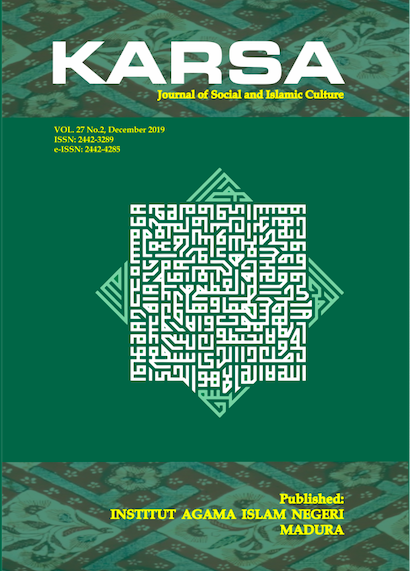The Tension and Synergy of Ethical Sources in The Relations of Lecturers and Students in Indonesian Universities
 Abstract views: 327
,
Abstract views: 327
,
 PDF downloads: 319
PDF downloads: 319
Abstract
Downloads
References
Al-Hamdi, Ridho. 2015. “Coping with Religious Tolerance and Gender Equality: Comparing Islam and Good Governance Perspectives.” Indonesian Journal for Islam and Muslim Societies 5, no.2 (2015): 163-193.
Bourdieu, P., and L. J. D. Wacquant. 1992. An Invitation to Reflexive Sociology. Cambridge: Polity Press.
Chidester, David. 1987. Patterns of Action. Religion and Ethics in a Comparative Perspective. Belmont, California: Wardsworth Publishing.
Daniel, Eleanor. John W.Wade, Charles Gresham. 1980. Introduction to Christian Education. Cincinnati, Ohio: Standard Pub.
Fakih, Mansour. 1999. Gender dan Perubahan Organisasi: Menjem-batani Kesenjangan antara Kebijakan dan Praktik. Yogyakarta: Insist.
Geertz, Hildred. 1985. Keluarga Jawa. Jakarta : PT. Grafiti Press.
Miskawayh, Ibnu. 1977. The Refinement of Character (Tahdzibul Alkhlak). Translated by Constantine K. Zurayh. USA: Kazi Publication, Inc.
Mutahir, A. Hajar. Mengenal Konsep Etika Immanuel Kant, April 13, 2015. https://grahafilsafat.wordpress.com/2015/04/13/konsep-etika-modern-immanuel-kant-2/
Kant, Immanuel. 2005. Kritik Atas Akal Budi Praktis. Translated by Nurhadi. Yogyakarta: Pustaka Pelajar.
Koentjaraningrat. 1969. Rintangan - Rintangan Mental dalam Pembangun Ekonomi di Indonesia. Djakarta: Bhratara.
Lombard, Deney. 1996. Nusa Jawa: Silang Budaya, Jakarta : PT. Gramedia Pustaka Utama.
Machasin, Muhammad. 2007. “Theology and Pluralistic Ethics: An Indonesian Muslim Perspective.” in Responsible Leadership: Global and Contextual Perspective. Edited by Christoph Stueckelberger and Jesse N.K. Mugambi. Geneva: globethics.net and WCC Publications.
Nasr, S. Hussein. 2000. Ideals and Realities of Islam. Chicago: ABC International Group, Inc.
Said, C. “Paradigma Pendidikan dalam Perspektif Islam; Surat Al-Alaq 1-5.” HUNAFA: Jurnal Studia Islamika 13, no.1 (2016): 91-117.
Shermer, Michael. 2005. The Science of Good and Evil: Why People Cheat, Gossip, Care, Share, and Follow the Golden Rule. New York: Henry Holt.
Sittichai, R., and P.K. Smith. “Bullying in South-East Asian Countries: A review.” Aggression and Violent Behavior 23 (2015): 22-35.
Sodik, Mochamad. 2004. Telaah Ulang Wacana Seksualitas. Yogyakarta: PSW UIN SUnan Kalijaga-McGill-CIDA.
Solove, D. J. 2007. The Future of Reputation: Gossip, Rumor, and Privacy on The Internet. New Haven: Yale University Press.
Stueckelberger, C.W. Fust, O. Ike. 2016. Global Ethics for Leadership: Values and Virtues for Life. Geneva: globethics.net.
Taylor, Charles. 2004. Modern Social Imaginaries. Durham, NC: Duke University Press.
Trani, Eugene. P., and Robert D. Holsworth. 2010. The Indispensable University: Higher Education, Economic Development and the Knowledge Economy. Plymouth, UK: Rowan and Littlefield.
Wadud, Amina. 1999. Qur’an and Women: Rereading the Sacred Text from a Women’s Perspective. New York: Oxford University Press.
Wieringa, Saskia. 2002. Sexual Politics in Indonesia. The Hague: Institute of Social Studies and Plagrave Macmillan.
The journal operates an Open Access policy under a Creative Commons Non-Commercial Share-Alike license. Authors who publish with this journal agree to the following terms:
- Authors retain copyright and grant the journal right of first publication with the work simultaneously licensed under a Creative Commons Attribution License that allows others to share the work with an acknowledgement of the work's authorship and initial publication in this journal.
- Authors are able to enter into separate, additional contractual arrangements for the non-exclusive distribution of the journal's published version of the work (e.g., post it to an institutional repository or publish it in a book), with an acknowledgement of its initial publication in this journal.
- Authors are permitted and encouraged to post their work online (e.g., in institutional repositories or on their website) prior to and during the submission process, as it can lead to productive exchanges, as well as earlier and greater citation of published work.





















